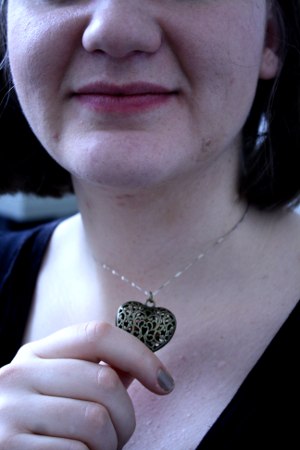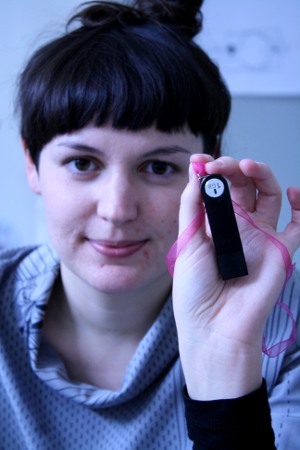User:Eleanorg/1.2/Distributed Hosting: Difference between revisions
No edit summary |
|||
| (3 intermediate revisions by the same user not shown) | |||
| Line 6: | Line 6: | ||
==Physical Hosting experiments== | ==Physical Hosting experiments== | ||
Censored images have been distributed to volunteers, for safekeeping over the weekend. | |||
<div style="float:left">[[File:davePortraitSmall.JPG]]</div> | |||
<div style="float:left">[[File:mariePortraitSmall.JPG]]</div> | |||
<div>[[File:petraPortraitSmall.JPG]]</div> | |||
===Thoughts=== | |||
<i>Dave carried an SD card in his wallet over one weekend, sealed within brown paper. He was given the choice of whether or not to open it, to discover the card's contents.</i> | |||
Firstly (and obviously), it made me think quite a bit about the 'ethics of | |||
data storage', or at least the conceptual processes involved in deciding to | |||
host, or not to host. I experienced two versions of this over the weekend: | |||
my first thoughts were that I would leave the card in my wallet and not | |||
check its contents. I suppose this is the equivalent attitude of the | |||
majority of data storage companies - data is assumed innocent until | |||
reported otherwise. In this case, the fact that you are 'hosting' is easy | |||
to forget about. The data remains abstract/imaginary. | |||
The second version: I was thinking about your project again on Sunday, and | |||
thought about another king of hosting - that is, knowing exactly what the | |||
content is, and then deciding whether you can host it or not. So evaluating | |||
the data and deciding whether it fits in with a personal Terms of Service. | |||
When I saw the censored image the data gained visual form and meaning, and | |||
as a result the 'act of hosting' for me became a very conscious act. In | |||
this instance, the 'host' is not a passive participant but in knowing the | |||
contents becomes implicit and actively responsible for keeping the data in | |||
their possession. | |||
Otherwise, in the unlikely case that I would have been the victim in a | |||
mysterious mistaken identity murder case over the weekend, I can only | |||
imagine how puzzled the police would have been by the SD card with the | |||
strange contents, wrapped in brown paper, tucked away in my wallet. | |||
Latest revision as of 18:52, 6 April 2012
Experiments here are the early stages of a larger project, probably end of year for Yr 1.
Proposal: BodyBook will facilitate the creation of a distributed archive of images censored from Facebook because of their 'bodily' content (nudity, breastfeeding etc). Participants will be invited to contribute images that they have had removed from their pages by Facebook admins, and the BodyBook website will match them with other partipants who are willing to "host" the image for them. Participants will be encouraged to interpret "hosting" in a broad sense: from hosting the image literally on their own server, to physically carrying it with them - provided that the host have bodily guardianship of their chosen image. The BodyBook website will provide an index of this physical archive.
Physical Hosting experiments
Censored images have been distributed to volunteers, for safekeeping over the weekend.
Thoughts
Dave carried an SD card in his wallet over one weekend, sealed within brown paper. He was given the choice of whether or not to open it, to discover the card's contents.
Firstly (and obviously), it made me think quite a bit about the 'ethics of
data storage', or at least the conceptual processes involved in deciding to
host, or not to host. I experienced two versions of this over the weekend:
my first thoughts were that I would leave the card in my wallet and not
check its contents. I suppose this is the equivalent attitude of the
majority of data storage companies - data is assumed innocent until
reported otherwise. In this case, the fact that you are 'hosting' is easy
to forget about. The data remains abstract/imaginary.
The second version: I was thinking about your project again on Sunday, and
thought about another king of hosting - that is, knowing exactly what the
content is, and then deciding whether you can host it or not. So evaluating
the data and deciding whether it fits in with a personal Terms of Service.
When I saw the censored image the data gained visual form and meaning, and
as a result the 'act of hosting' for me became a very conscious act. In
this instance, the 'host' is not a passive participant but in knowing the
contents becomes implicit and actively responsible for keeping the data in
their possession.
Otherwise, in the unlikely case that I would have been the victim in a mysterious mistaken identity murder case over the weekend, I can only imagine how puzzled the police would have been by the SD card with the strange contents, wrapped in brown paper, tucked away in my wallet.



